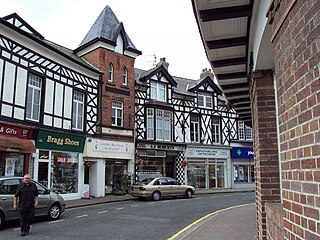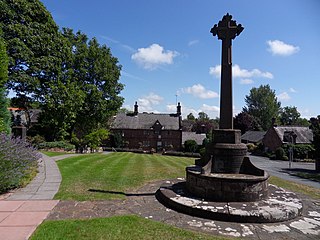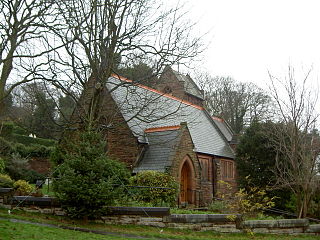
Hoylake is a seaside town in the Metropolitan Borough of Wirral, Merseyside, England. It is at the north west of the Wirral Peninsula, near West Kirby and where the River Dee meets the Irish Sea. Historically part of Cheshire, the Domesday Book of 1086 recorded it within the Hundred of Wilaveston.

West Kirby is a coastal town in the Metropolitan Borough of Wirral, Merseyside, England. In the north west of the Wirral Peninsula and at the mouth of the River Dee, the town is contiguous with Hoylake and historically within Cheshire.

Meols is a suburb in the Metropolitan Borough of Wirral, Merseyside, England. On the north coast of the Wirral Peninsula, it forms a contiguous built up area with the nearby town of Hoylake which lies to the west. Historically in Cheshire, since 1 April 1974 it has been part of the Metropolitan Borough of Wirral.

Irby is a village on the Wirral Peninsula, in Merseyside, England. The village covers an area of 20 square kilometres. To the north of Irby lies the associated hamlet of Irby Hill. It is part of the Greasby, Frankby and Irby Ward of the Metropolitan Borough of Wirral and is within the parliamentary constituency of Wirral West.

The Wirral Peninsula, known locally as the Wirral, is a peninsula in North West England. The roughly rectangular peninsula is about 15 miles (24 km) long and 7 miles (11 km) wide, and is bounded by the Dee Estuary to the west, the Mersey Estuary to the east, and Liverpool Bay to the north.

Caldy Hill is an area of heath and woodland on a sandstone outcrop on the Wirral Peninsula. The land was bought by Hoylake District Council between 1897 and 1974. The village of Caldy is nearby.

Caldy is a small, affluent village on the Wirral Peninsula, Merseyside, England, south-east of West Kirby. It is part of the West Kirby & Thurstaston Ward of the Metropolitan Borough of Wirral, and is in the parliamentary constituency of Wirral West. At the time of the 2001 Census, Caldy had 1,290 inhabitants, of a total ward population of 12,869.

Thurstaston is a village and former civil parish, in the Wirral district, in Merseyside, England, on the Wirral Peninsula. It is part of the West Kirby and Thurstaston Ward and the parliamentary constituency of Wirral West. The village lies on the A540 road between Heswall and Caldy, although it extends some distance down Station Road to the Wirral Way and the River Dee estuary.

Saughall Massie is a village on the Wirral Peninsula, Merseyside, England. It is part of the Moreton West & Saughall Massie Ward of the Metropolitan Borough of Wirral and the parliamentary constituency of Wallasey. A small village primarily made up of large fields owned by local farmers, it is bordered by Greasby, Meols, Moreton and Upton. At the 2001 census Saughall Massie had a population of 1,260.

Noctorum is a suburb of Birkenhead, Merseyside, England. Administratively it is within the Metropolitan Borough of Wirral as part of Claughton Ward. Noctorum is in the north east of the Wirral Peninsula, bounded by the Beechwood estate to the north, Claughton and Oxton to the east and south east, and the River Fender and M53 motorway to the west.

Frankby is a village and former civil parish, in the Wirral district, in Merseyside, England. It is located on the Wirral Peninsula between Greasby and Newton on the outskirts of the town of West Kirby and south of Hoylake. The hamlet of Larton is to the north west. Historically within the county of Cheshire, it is part of the Greasby, Frankby and Irby Ward and is in the parliamentary constituency of Wirral West.

Newton is a village on the Wirral Peninsula, in the Metropolitan Borough of Wirral, Merseyside, England. It is a part of the suburban town of West Kirby, the local government ward of West Kirby and Thurstaston and the parliamentary constituency of Wirral West. Contiguous with Newton is the suburb of Grange to the west. The hamlet of Larton is to the east.

Larton is a hamlet near the town of West Kirby, on the Wirral Peninsula, in Merseyside, England. Administratively it is part of the local government ward of Greasby, Frankby and Irby in the Metropolitan Borough of Wirral and is within the parliamentary constituency of Wirral West.

Claughton is a village and suburb of Birkenhead, on the Wirral Peninsula, Merseyside, England. It is situated approximately 3 km (1.9 mi) to the west of Birkenhead town centre, adjacent to Birkenhead Park. Administratively, Claughton is a ward of the Metropolitan Borough of Wirral. Before local government reorganisation on 1 April 1974, it was part of the County Borough of Birkenhead, within the county of Cheshire.

Gayton is a village in the Wirral district, in Merseyside, England, located between Heswall and Parkgate. At the 2001 Census, the population of Gayton stood at 3,110.

The Church of the Resurrection and All Saints is in the village of Caldy, Wirral, Merseyside, England. The church is recorded in the National Heritage List for England as a designated Grade II listed building. It is an active Anglican church in the diocese of Chester, the archdeaconry of Chester and the deanery of Wirral North. It is a daughter church of St Bridget's Church, West Kirby.
Wirral Grammar School for Girls is an all-girls grammar school on the Wirral Peninsula in Merseyside, England.

Calday Grange Grammar School is an 11–18 non-denominational, academically selective, boys' grammar school, founded in 1636, situated on Caldy Hill in Grange, a suburb of West Kirby on the Wirral peninsula, England. The school admits boys from age 11 to 18 and, since 1985, girls for the sixth form only. The school has academy status, hosts the Wirral Able Children Centre, and has been awarded Sportsmark Gold and Investors in People status.

Hoylake Urban District was an urban district in Cheshire, England. It was formerly known as West Kirby and Hoylake Urban District (1894–97), then Hoylake and West Kirby Urban District (1897–1933). It was the local authority for the towns of Hoylake and West Kirby, in the north-west of the Wirral Peninsula.
Andrew William Maxwell was an English rugby union international.



















